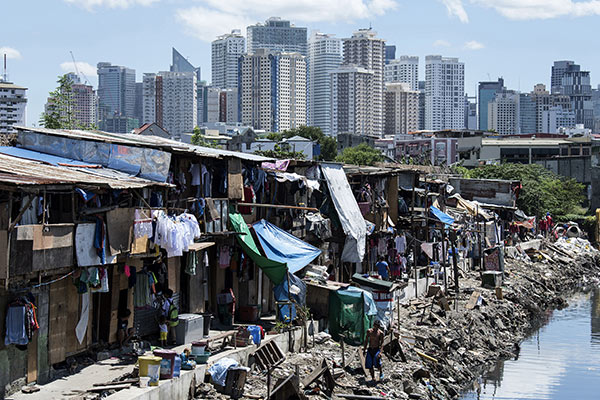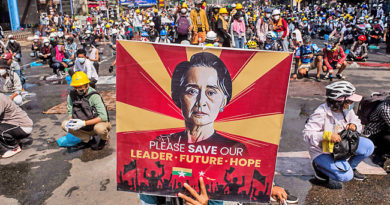Singapore : Urban inequality a growing risk in Asia, warns World Bank
This file photo taken on August 17, 2017, shows people living in a settlement as the skyline of Manila’s financial district is seen in the background. President Rodrigo Duterte’s deadly drug war and armed Islamist rebellion pose “rising” risks to the Philippine economy, though it should continue to grow robustly in the short term, Moody’s Investors Service said September 16, 2017. Noel Celis/AFP
.
.
SINGAPORE — Widening inequality in Asia’s teeming cities could lead to potentially risky social divisions, the World Bank warned Tuesday, urging governments to do more to help the urban poor.
.
.
Half of the region’s population live in cities and rapid urbanization has helped lift 655 million people out of poverty, the bank said in a new report.
But East Asia and the Pacific are still home to the world’s biggest population of slum dwellers at 250 million, sizeable portions of them found in China, Indonesia and the Philippines, the bank said.
READ: Drug war, Islamists ‘rising’ risks for Philippine economy — Moody’s
While studies on inequality often focus on the disparity between urban and rural areas, the expanding chasm among city dwellers was a major problem, it said.
Victoria Kwakwa, the bank’s vice president for the region, said a growing number of people who move to cities lack access to basic services, housing and jobs, which was creating growing resentment over the gulf between urban rich and poor.
“Widening inequalities can create social divisions in society and it’s much more stark in cities because you have the wealthy living right next door too often to the urban poor in small spaces,” said Judy Baker, the bank’s urban specialist and the report’s lead author.
“We’ve seen in other parts of the world that this can create some unrest,” she told AFP.
READ: Stark inequality: Oxfam says 8 men as rich as half the world
The bank urged governments to craft policies targeted at connecting the urban poor with job markets, ensuring quality and affordable housing and access to services such as public transport.
In the Mongolian capital Ulan Bator, low-income commuters can spend as much as 36 percent of their monthly expenses on bus fare because of inefficient public transport, the bank said.
In Indonesia, 27 percent of the urban population do not have access to sanitation facilities, higher than 21 percent in the Philippines, it said.
.
Courtesy: THE PHILSTAR
.
Courtesy: THE PHILSTAR
.
<>
NOTE : All photographs, news, editorials, opinions, information, data, others have been taken from the Internet ..aseanews.net |
[email protected] |For comments,
[email protected] |For comments,
.
Email to :
Pahulu Gan – Contributor | [email protected]









